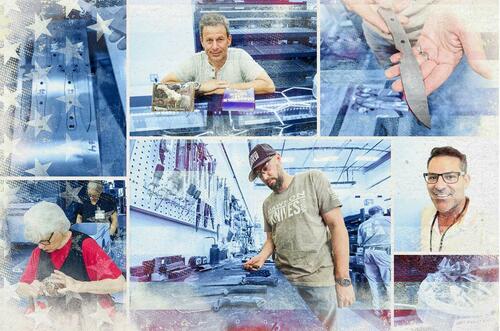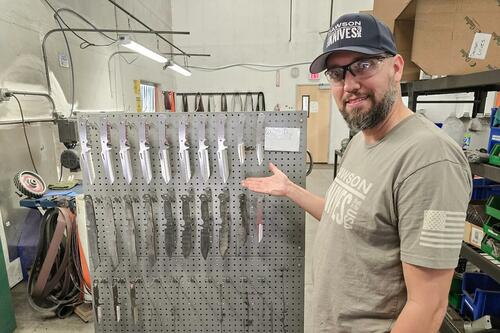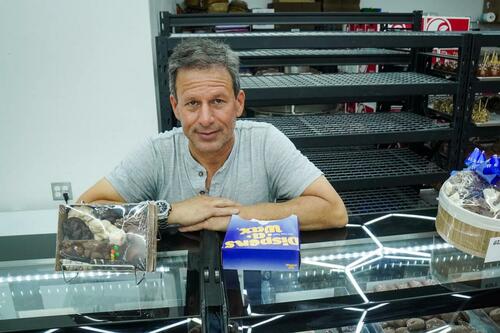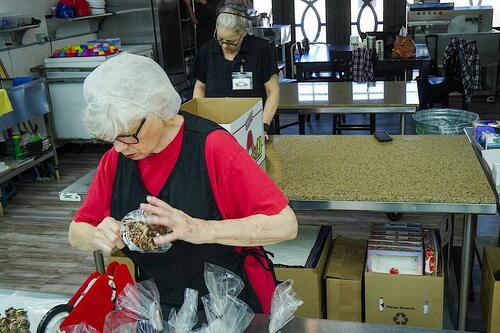Authored by Allan Stein via The Epoch Times (emphasis ours),
It’s more than just a label. “Made in America” represents pride and the national spirit, says John Roy, CEO of Dawson Knives in Prescott, Arizona.

The company he heads is a prime example of that spirit. Founded more than 50 years ago by a Vietnam vet with machinery made from parts found in a local landfill, the knife company boasts that it’s “three generations strong.”
Roy believes domestic companies will thrive under the import tariffs enacted by the Trump administration.
With consumption accounting for nearly 70 percent of the U.S. economy, Roy believes there is a strong market for products made in America.
In 2023, nearly half of the goods purchased by Americans were “made in America,” according to the Department of Commerce. That figure comes with the caveat that “made in America” sometimes means “assembled in America,” with products containing imported components.
The total gross domestic purchases in the country reached $3.7 trillion, with $1.9 trillion of that amount attributable to U.S. industries.
“When you keep it domestic and your dollars here [in America], it pays off,” Roy says proudly, wearing a T-shirt and cap emblazoned with his company logo.
“We rode out a pandemic, and we’re going to ride through these tariffs,” he told The Epoch Times.
That’s not just a bold statement, Roy said.
After President Donald Trump announced a sweeping array of tariffs on April 2, Roy reported that Dawson’s knife sales increased from $11,000 to $15,000 per day.
He said the company expects orders to double from 4,000 to 8,000 for 2025. It produces 40 different models of knives, including hunting, survival, culinary, and heirloom varieties.
Roy is convinced that many American companies can withstand a global trade war by sourcing materials domestically and maximizing production efficiency.
“In order to have that efficiency, we have to really invest in computers … everything to help us down the line to make better models, better manufacturing, and reduce steps,” he said.
The company currently employs 15 people and operates within 12,000 square feet of industrial space.
Roy said many consumers prefer goods that are “completely American-made.”

He does not foresee any problems sourcing materials as long as his domestic supply remains steady within a global tariff environment.
Government policies that impact his suppliers have also been a challenge.
Roy said that a longtime steel producer and supplier in New York recently went out of business due to restrictions on coal—a key ingredient in steel production.
Dawson Knives had maintained a working relationship with the steel producer since the company started in 1973.
However, another U.S.-based company has stepped in to smelt the needed steel, Roy said.
Despite potentially higher costs for some raw materials in the United States, Roy expects that using domestic suppliers will mean fewer “headaches” related to shipping and no import duties.
He views this as a distinct advantage.
With the materials he currently has in stock, and absent any unforeseen circumstances, he expects to weather a global trade upheaval for at least a year and a half.
Roy based his timeline on his supplier’s steel inventory for the next year and a half.
“After that, we would have to pay tariffs on steel because one component of the steel we use can only be found in Switzerland,” he said.
“The tariffs will not affect us unless they go on for a long time.”
Sweet Success
Jay Levine owns San Francisco Chocolate Factory, a Phoenix-based company with more than 28 years of experience.
His company currently employs four full-time staff members, who produce gourmet chocolates, fudge, and treats for special events and walk-in customers.
The chocolatier sources his ingredients domestically, making his business largely immune to tariffs.
“Everything I buy is local [or it] comes from the United States,” Levine, a Montreal native, told The Epoch Times.

He buys his apples from Washington, strawberries and nuts from other domestic suppliers. The American-grown items are not subject to import restrictions and are readily available.
The one exception is high quality Callebaut chocolate from Belgium, an ingredient that is now subject to a 10 percent import duty.
As he completes a new facility on Van Buren Street in Phoenix, Levine said his business has continued to do well despite the imposition of new tariffs.
“Quality really has no rights on it,” he said, “so you want to do top quality chocolates. All of our food products come from the United States.”
If tariffs continue, Levine said he “would switch to good [domestic] chocolate, which is locally grown here.” However, even that local supplier gets its cocoa beans from Ivory Coast.
According to the Observatory of Economic Complexity, an international trade data platform, the Ivory Coast’s main imports to the United States in January included cocoa beans valued at $161 million and cocoa paste valued at $41.7 million, followed by rubber valued at $19.1 million.
The U.S. government imposed a 21 percent tariff on goods from the tiny West African country, although it was paused for 90 days to facilitate negotiations. However, all U.S. trading partners are still subject to a baseline tariff of 10 percent.
Tariffs aren’t driving the current high prices though.
“I know that chocolate has doubled [in price] in the past year—and the reason for that was just price inflation,” Levine said. “I’ve never seen chocolate so high—ever.”
Levine expressed confidence that his company can endure the current tariffs, due to a steady demand for chocolate in America.
“This is an indulgence,” he said. “People will pay extra for it.”
That being said, “they won’t be buying as much chocolate“ under the tariffs, he predicted. ”Price is a factor.”

Treading Confidently
Don’t Tread On Me was founded in 2004 and American-made shirts and hoodies are the foundation of its clothing product line.
The exception are the company’s hats, which feature American motifs with the company’s signature coiled rattlesnake emblem.
“Right now, all of the hats and beanies are [produced] overseas, but I’ve been looking into domestic options,” company president Tyler Windes told The Epoch Times.
“There aren’t very many USA hat manufacturers, so it does make it difficult sourcing those.”
Windes said that even before the recent tariff changes, the company was considering moving its hat production to the United States.
“These new policies have simply reinforced our commitment and accelerated that timeline,” Windes said.
Sourcing his hats from a domestic manufacturer has been challenging, nonetheless Windes remains hopeful that the tariffs will lead to increased investment in American textile and apparel production.
This development would make it easier for companies like his to manufacture their products fully within the United States, he said.
Read the rest here...
Loading...